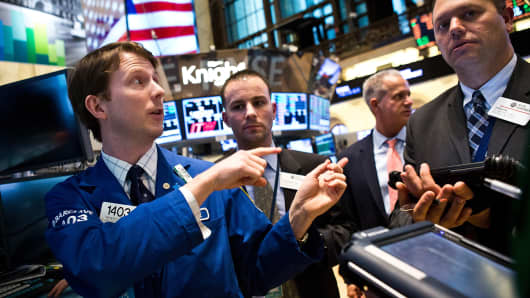Elsewhere:
1) Retailers continue to give cautious guidance:
Kohl's beat after lowering guidance, but is trading down. As with many retailers this week, 2013 guidance is below expectations. Full-year earnings per share (EPS) of $4.15 to $4.45 versus consensus of $4.57; first-quarter EPS of $0.55 to $0.63 is at the low end of the $0.62 analyst consensus.
CEO Kevin Mansell acknowledged heavy discounts in January, the last month of the quarter: "Sales for the fourth quarter developed very late and, as a result, came at a cost to profitability. We were, however, able to end the quarter with levels of inventory appropriate for a strong transition to spring."
Limited Brands also guided below expectations: Full-year EPS of $2.92 to $3.12 is below the $3.24 analyst consensus, as is first-quarter EPS of $0.40 to $0.45, below the $0.51 analyst consensus.
This follows Dollar Tree, Home Depot, Abercrombie & Fitch, and Nordstrom. Despite some of the positive developments on housing, retailers seem uncomfortable that consumers are going to be able to keep spending. The wage gains have not been high enough to support expanded spending, many worry.
One other point: The J.C. Penney loss ($1.95 a share, well above the expected loss of $0.18 a share) took a huge chunk out of retail earnings overall profits in the fourth quarter. Profits were up 11.7 percent as of yesterday, according to RetailMetrics. With J.C. Penney included, profits drop to 8.3 percent.
2) One side effect of Federal Reserve Chairman Ben Bernanke's insistence he will not raise rates or end quantitative easing any time soon: Bond funds are holding up. No real sign of any "Great Rotation" out of bonds and into stocks, although stock bond funds have attracted a small chunk of money since the start of the year. Vanguard's Total Bond Index (BND), the largest broad bond exchange-traded fund with $18 billion in assets, has been stable all week and is up in the month of February, after declining in December and January; same with the largest corporate bond ETF, the iShares Investment Grade Corporate (LQD), with $24 billion in assets, which is also up in February.
Same with high-yield funds: They are up in February as well; the largest high-yield ETF, the iShares High Yield Corporate (HYG), is not far from multi-year highs.
—By CNBC's Bob Pisani










